WorldCom: A Case Study on Financial Reporting and Audit Failures
VerifiedAdded on 2023/01/23
|10
|2752
|30
Report
AI Summary
This report provides an in-depth analysis of the WorldCom financial scandal, examining the fraudulent activities, accounting failures, and audit deficiencies that led to the company's collapse. It explores the lack of independence within the audit committee, the failure of both internal and external auditors to detect and report fraud, and the incorrect valuation of line costs. The report further discusses the impact of these failures, particularly in Australia, where stringent measures were adopted to improve corporate disclosure and auditor independence. It highlights the key recommendations for corporate governance, including the role of independent directors and the limitations on non-audit services, and concludes with a discussion on how to prevent similar frauds in the future, emphasizing the importance of robust auditing practices and accurate financial reporting. The analysis covers the importance of governance structure, internal controls, and the role of auditors in ensuring the integrity of financial statements. The report provides insights into the causes and consequences of the WorldCom scandal and the measures taken to prevent similar incidents in the future.
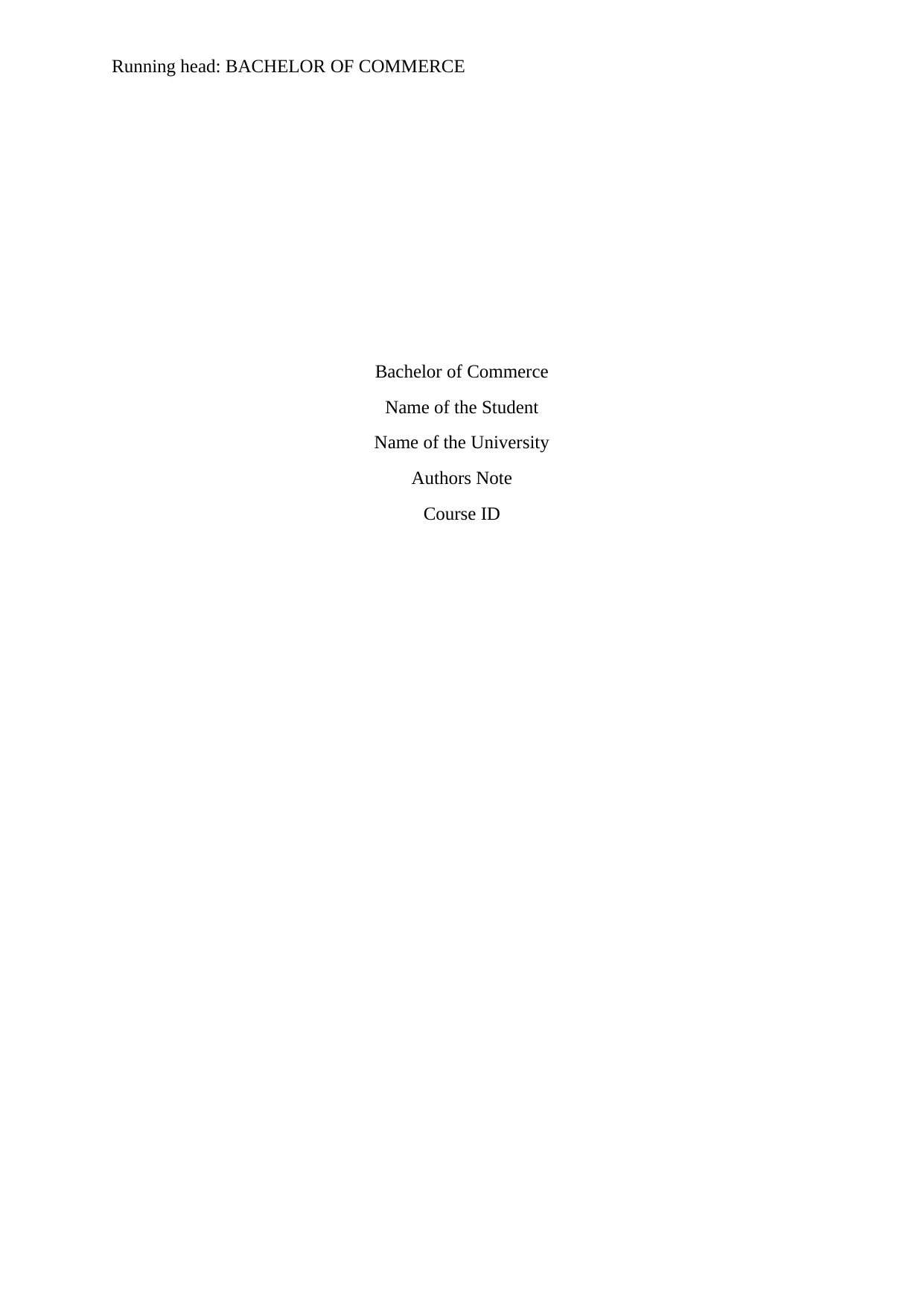
Running head: BACHELOR OF COMMERCE
Bachelor of Commerce
Name of the Student
Name of the University
Authors Note
Course ID
Bachelor of Commerce
Name of the Student
Name of the University
Authors Note
Course ID
Paraphrase This Document
Need a fresh take? Get an instant paraphrase of this document with our AI Paraphraser
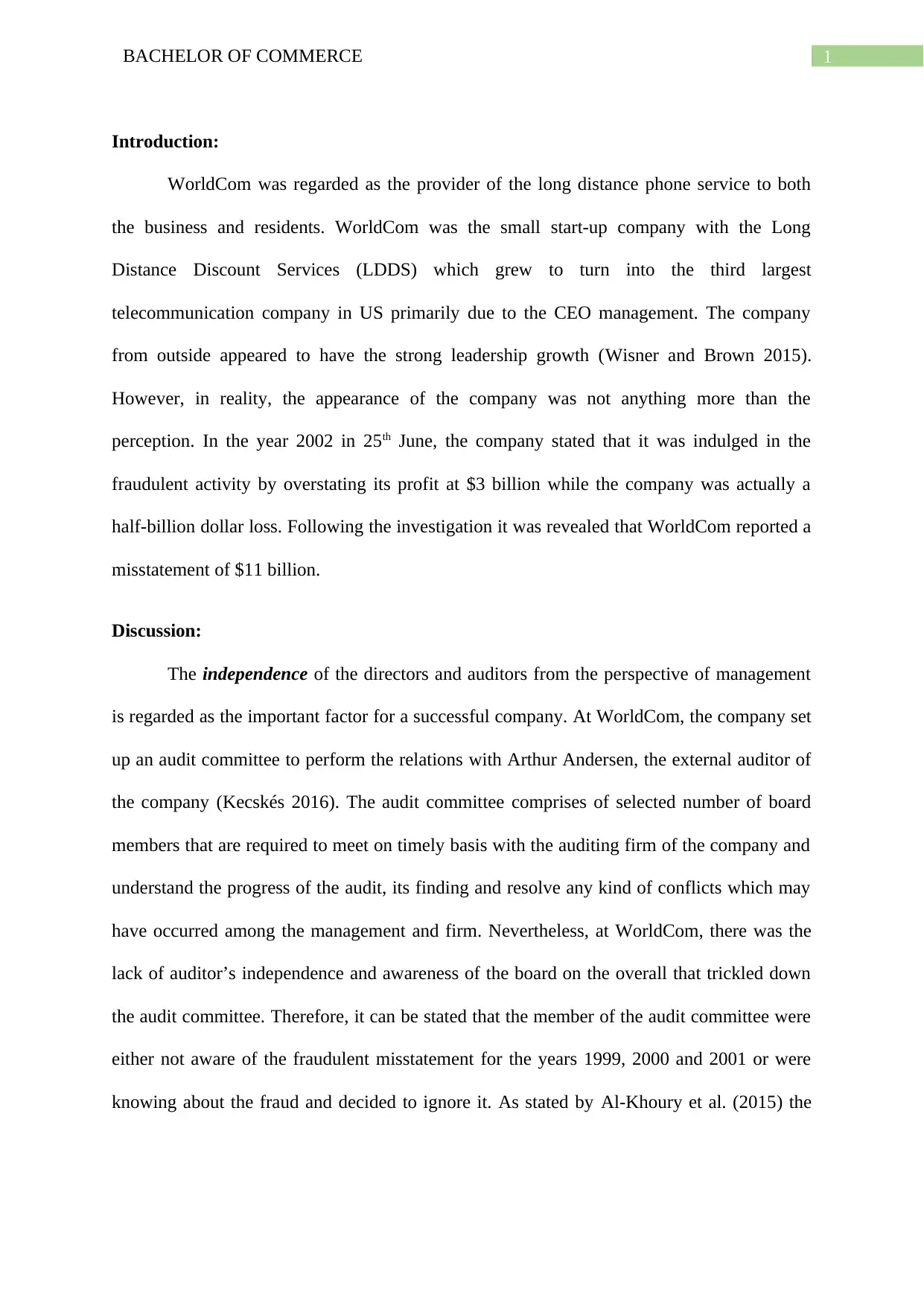
1BACHELOR OF COMMERCE
Introduction:
WorldCom was regarded as the provider of the long distance phone service to both
the business and residents. WorldCom was the small start-up company with the Long
Distance Discount Services (LDDS) which grew to turn into the third largest
telecommunication company in US primarily due to the CEO management. The company
from outside appeared to have the strong leadership growth (Wisner and Brown 2015).
However, in reality, the appearance of the company was not anything more than the
perception. In the year 2002 in 25th June, the company stated that it was indulged in the
fraudulent activity by overstating its profit at $3 billion while the company was actually a
half-billion dollar loss. Following the investigation it was revealed that WorldCom reported a
misstatement of $11 billion.
Discussion:
The independence of the directors and auditors from the perspective of management
is regarded as the important factor for a successful company. At WorldCom, the company set
up an audit committee to perform the relations with Arthur Andersen, the external auditor of
the company (Kecskés 2016). The audit committee comprises of selected number of board
members that are required to meet on timely basis with the auditing firm of the company and
understand the progress of the audit, its finding and resolve any kind of conflicts which may
have occurred among the management and firm. Nevertheless, at WorldCom, there was the
lack of auditor’s independence and awareness of the board on the overall that trickled down
the audit committee. Therefore, it can be stated that the member of the audit committee were
either not aware of the fraudulent misstatement for the years 1999, 2000 and 2001 or were
knowing about the fraud and decided to ignore it. As stated by Al-Khoury et al. (2015) the
Introduction:
WorldCom was regarded as the provider of the long distance phone service to both
the business and residents. WorldCom was the small start-up company with the Long
Distance Discount Services (LDDS) which grew to turn into the third largest
telecommunication company in US primarily due to the CEO management. The company
from outside appeared to have the strong leadership growth (Wisner and Brown 2015).
However, in reality, the appearance of the company was not anything more than the
perception. In the year 2002 in 25th June, the company stated that it was indulged in the
fraudulent activity by overstating its profit at $3 billion while the company was actually a
half-billion dollar loss. Following the investigation it was revealed that WorldCom reported a
misstatement of $11 billion.
Discussion:
The independence of the directors and auditors from the perspective of management
is regarded as the important factor for a successful company. At WorldCom, the company set
up an audit committee to perform the relations with Arthur Andersen, the external auditor of
the company (Kecskés 2016). The audit committee comprises of selected number of board
members that are required to meet on timely basis with the auditing firm of the company and
understand the progress of the audit, its finding and resolve any kind of conflicts which may
have occurred among the management and firm. Nevertheless, at WorldCom, there was the
lack of auditor’s independence and awareness of the board on the overall that trickled down
the audit committee. Therefore, it can be stated that the member of the audit committee were
either not aware of the fraudulent misstatement for the years 1999, 2000 and 2001 or were
knowing about the fraud and decided to ignore it. As stated by Al-Khoury et al. (2015) the
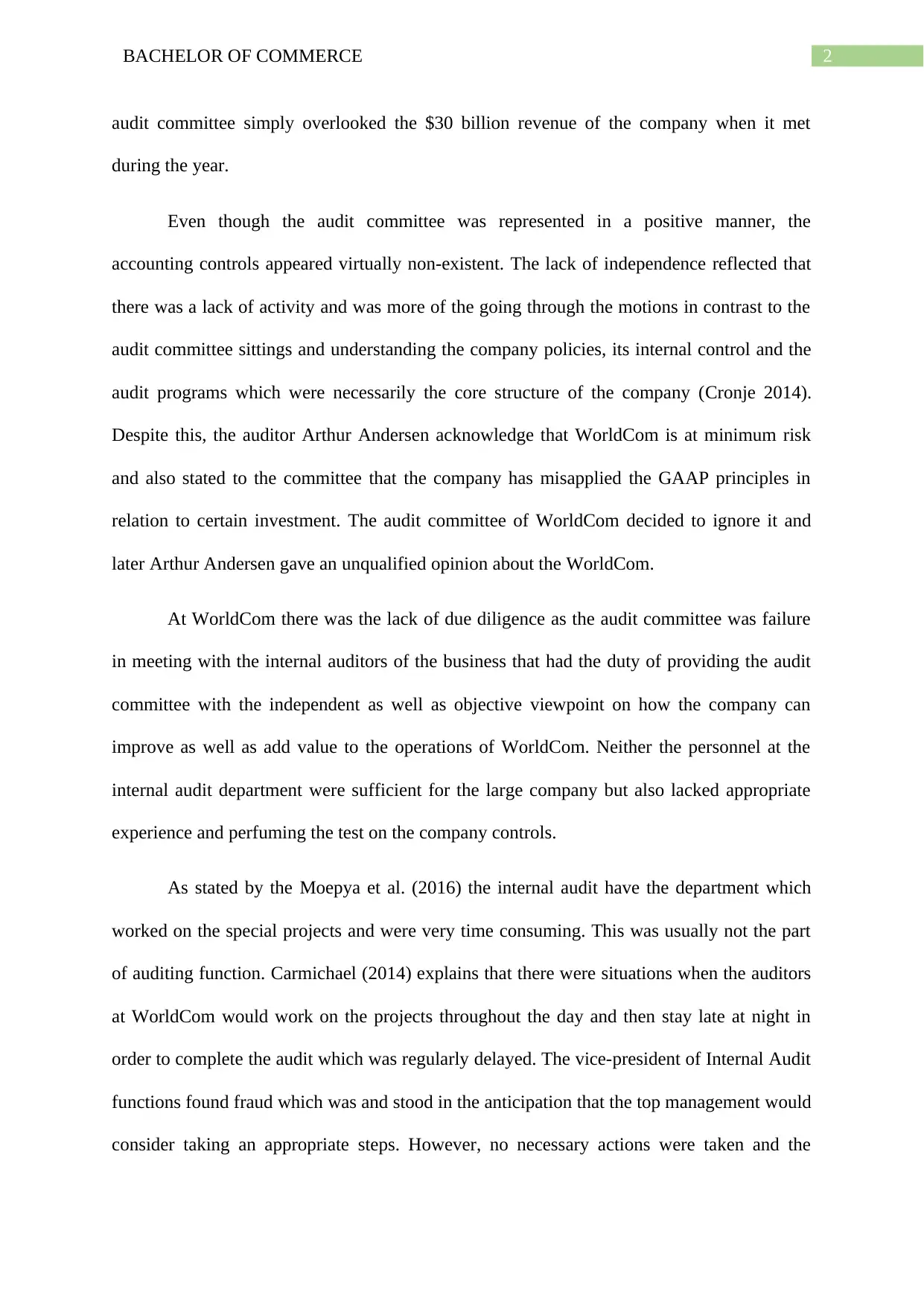
2BACHELOR OF COMMERCE
audit committee simply overlooked the $30 billion revenue of the company when it met
during the year.
Even though the audit committee was represented in a positive manner, the
accounting controls appeared virtually non-existent. The lack of independence reflected that
there was a lack of activity and was more of the going through the motions in contrast to the
audit committee sittings and understanding the company policies, its internal control and the
audit programs which were necessarily the core structure of the company (Cronje 2014).
Despite this, the auditor Arthur Andersen acknowledge that WorldCom is at minimum risk
and also stated to the committee that the company has misapplied the GAAP principles in
relation to certain investment. The audit committee of WorldCom decided to ignore it and
later Arthur Andersen gave an unqualified opinion about the WorldCom.
At WorldCom there was the lack of due diligence as the audit committee was failure
in meeting with the internal auditors of the business that had the duty of providing the audit
committee with the independent as well as objective viewpoint on how the company can
improve as well as add value to the operations of WorldCom. Neither the personnel at the
internal audit department were sufficient for the large company but also lacked appropriate
experience and perfuming the test on the company controls.
As stated by the Moepya et al. (2016) the internal audit have the department which
worked on the special projects and were very time consuming. This was usually not the part
of auditing function. Carmichael (2014) explains that there were situations when the auditors
at WorldCom would work on the projects throughout the day and then stay late at night in
order to complete the audit which was regularly delayed. The vice-president of Internal Audit
functions found fraud which was and stood in the anticipation that the top management would
consider taking an appropriate steps. However, no necessary actions were taken and the
audit committee simply overlooked the $30 billion revenue of the company when it met
during the year.
Even though the audit committee was represented in a positive manner, the
accounting controls appeared virtually non-existent. The lack of independence reflected that
there was a lack of activity and was more of the going through the motions in contrast to the
audit committee sittings and understanding the company policies, its internal control and the
audit programs which were necessarily the core structure of the company (Cronje 2014).
Despite this, the auditor Arthur Andersen acknowledge that WorldCom is at minimum risk
and also stated to the committee that the company has misapplied the GAAP principles in
relation to certain investment. The audit committee of WorldCom decided to ignore it and
later Arthur Andersen gave an unqualified opinion about the WorldCom.
At WorldCom there was the lack of due diligence as the audit committee was failure
in meeting with the internal auditors of the business that had the duty of providing the audit
committee with the independent as well as objective viewpoint on how the company can
improve as well as add value to the operations of WorldCom. Neither the personnel at the
internal audit department were sufficient for the large company but also lacked appropriate
experience and perfuming the test on the company controls.
As stated by the Moepya et al. (2016) the internal audit have the department which
worked on the special projects and were very time consuming. This was usually not the part
of auditing function. Carmichael (2014) explains that there were situations when the auditors
at WorldCom would work on the projects throughout the day and then stay late at night in
order to complete the audit which was regularly delayed. The vice-president of Internal Audit
functions found fraud which was and stood in the anticipation that the top management would
consider taking an appropriate steps. However, no necessary actions were taken and the
⊘ This is a preview!⊘
Do you want full access?
Subscribe today to unlock all pages.

Trusted by 1+ million students worldwide
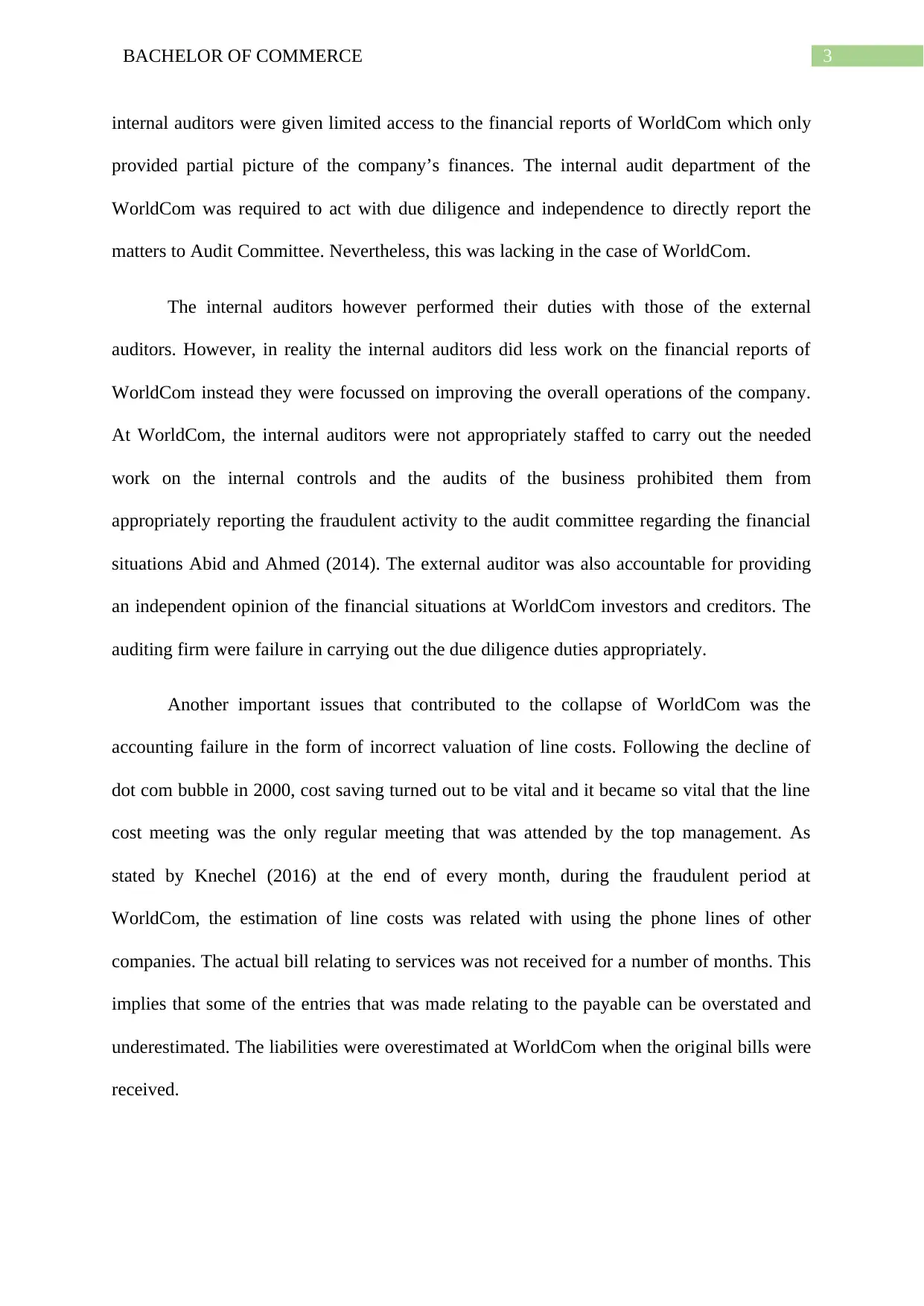
3BACHELOR OF COMMERCE
internal auditors were given limited access to the financial reports of WorldCom which only
provided partial picture of the company’s finances. The internal audit department of the
WorldCom was required to act with due diligence and independence to directly report the
matters to Audit Committee. Nevertheless, this was lacking in the case of WorldCom.
The internal auditors however performed their duties with those of the external
auditors. However, in reality the internal auditors did less work on the financial reports of
WorldCom instead they were focussed on improving the overall operations of the company.
At WorldCom, the internal auditors were not appropriately staffed to carry out the needed
work on the internal controls and the audits of the business prohibited them from
appropriately reporting the fraudulent activity to the audit committee regarding the financial
situations Abid and Ahmed (2014). The external auditor was also accountable for providing
an independent opinion of the financial situations at WorldCom investors and creditors. The
auditing firm were failure in carrying out the due diligence duties appropriately.
Another important issues that contributed to the collapse of WorldCom was the
accounting failure in the form of incorrect valuation of line costs. Following the decline of
dot com bubble in 2000, cost saving turned out to be vital and it became so vital that the line
cost meeting was the only regular meeting that was attended by the top management. As
stated by Knechel (2016) at the end of every month, during the fraudulent period at
WorldCom, the estimation of line costs was related with using the phone lines of other
companies. The actual bill relating to services was not received for a number of months. This
implies that some of the entries that was made relating to the payable can be overstated and
underestimated. The liabilities were overestimated at WorldCom when the original bills were
received.
internal auditors were given limited access to the financial reports of WorldCom which only
provided partial picture of the company’s finances. The internal audit department of the
WorldCom was required to act with due diligence and independence to directly report the
matters to Audit Committee. Nevertheless, this was lacking in the case of WorldCom.
The internal auditors however performed their duties with those of the external
auditors. However, in reality the internal auditors did less work on the financial reports of
WorldCom instead they were focussed on improving the overall operations of the company.
At WorldCom, the internal auditors were not appropriately staffed to carry out the needed
work on the internal controls and the audits of the business prohibited them from
appropriately reporting the fraudulent activity to the audit committee regarding the financial
situations Abid and Ahmed (2014). The external auditor was also accountable for providing
an independent opinion of the financial situations at WorldCom investors and creditors. The
auditing firm were failure in carrying out the due diligence duties appropriately.
Another important issues that contributed to the collapse of WorldCom was the
accounting failure in the form of incorrect valuation of line costs. Following the decline of
dot com bubble in 2000, cost saving turned out to be vital and it became so vital that the line
cost meeting was the only regular meeting that was attended by the top management. As
stated by Knechel (2016) at the end of every month, during the fraudulent period at
WorldCom, the estimation of line costs was related with using the phone lines of other
companies. The actual bill relating to services was not received for a number of months. This
implies that some of the entries that was made relating to the payable can be overstated and
underestimated. The liabilities were overestimated at WorldCom when the original bills were
received.
Paraphrase This Document
Need a fresh take? Get an instant paraphrase of this document with our AI Paraphraser
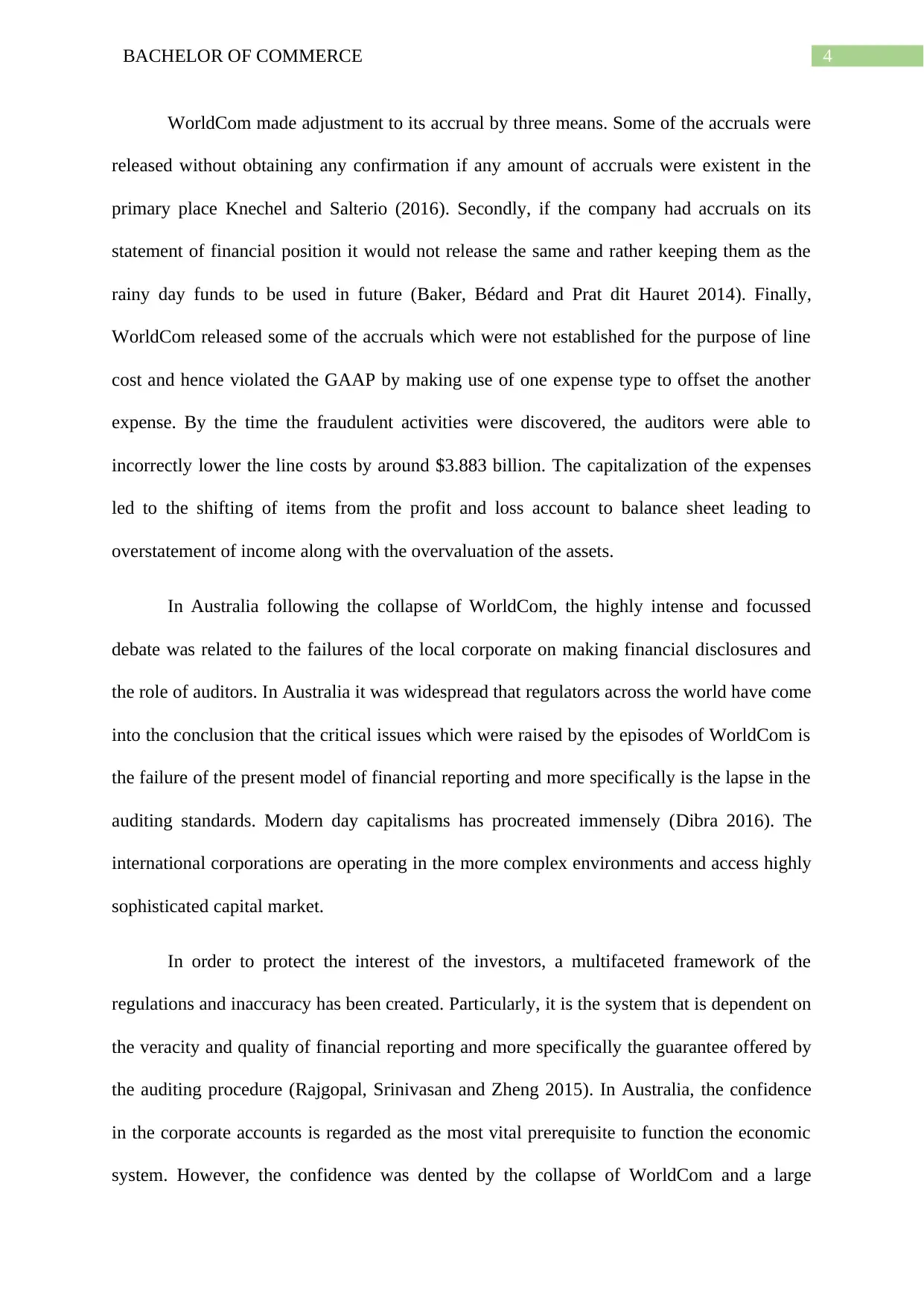
4BACHELOR OF COMMERCE
WorldCom made adjustment to its accrual by three means. Some of the accruals were
released without obtaining any confirmation if any amount of accruals were existent in the
primary place Knechel and Salterio (2016). Secondly, if the company had accruals on its
statement of financial position it would not release the same and rather keeping them as the
rainy day funds to be used in future (Baker, Bédard and Prat dit Hauret 2014). Finally,
WorldCom released some of the accruals which were not established for the purpose of line
cost and hence violated the GAAP by making use of one expense type to offset the another
expense. By the time the fraudulent activities were discovered, the auditors were able to
incorrectly lower the line costs by around $3.883 billion. The capitalization of the expenses
led to the shifting of items from the profit and loss account to balance sheet leading to
overstatement of income along with the overvaluation of the assets.
In Australia following the collapse of WorldCom, the highly intense and focussed
debate was related to the failures of the local corporate on making financial disclosures and
the role of auditors. In Australia it was widespread that regulators across the world have come
into the conclusion that the critical issues which were raised by the episodes of WorldCom is
the failure of the present model of financial reporting and more specifically is the lapse in the
auditing standards. Modern day capitalisms has procreated immensely (Dibra 2016). The
international corporations are operating in the more complex environments and access highly
sophisticated capital market.
In order to protect the interest of the investors, a multifaceted framework of the
regulations and inaccuracy has been created. Particularly, it is the system that is dependent on
the veracity and quality of financial reporting and more specifically the guarantee offered by
the auditing procedure (Rajgopal, Srinivasan and Zheng 2015). In Australia, the confidence
in the corporate accounts is regarded as the most vital prerequisite to function the economic
system. However, the confidence was dented by the collapse of WorldCom and a large
WorldCom made adjustment to its accrual by three means. Some of the accruals were
released without obtaining any confirmation if any amount of accruals were existent in the
primary place Knechel and Salterio (2016). Secondly, if the company had accruals on its
statement of financial position it would not release the same and rather keeping them as the
rainy day funds to be used in future (Baker, Bédard and Prat dit Hauret 2014). Finally,
WorldCom released some of the accruals which were not established for the purpose of line
cost and hence violated the GAAP by making use of one expense type to offset the another
expense. By the time the fraudulent activities were discovered, the auditors were able to
incorrectly lower the line costs by around $3.883 billion. The capitalization of the expenses
led to the shifting of items from the profit and loss account to balance sheet leading to
overstatement of income along with the overvaluation of the assets.
In Australia following the collapse of WorldCom, the highly intense and focussed
debate was related to the failures of the local corporate on making financial disclosures and
the role of auditors. In Australia it was widespread that regulators across the world have come
into the conclusion that the critical issues which were raised by the episodes of WorldCom is
the failure of the present model of financial reporting and more specifically is the lapse in the
auditing standards. Modern day capitalisms has procreated immensely (Dibra 2016). The
international corporations are operating in the more complex environments and access highly
sophisticated capital market.
In order to protect the interest of the investors, a multifaceted framework of the
regulations and inaccuracy has been created. Particularly, it is the system that is dependent on
the veracity and quality of financial reporting and more specifically the guarantee offered by
the auditing procedure (Rajgopal, Srinivasan and Zheng 2015). In Australia, the confidence
in the corporate accounts is regarded as the most vital prerequisite to function the economic
system. However, the confidence was dented by the collapse of WorldCom and a large
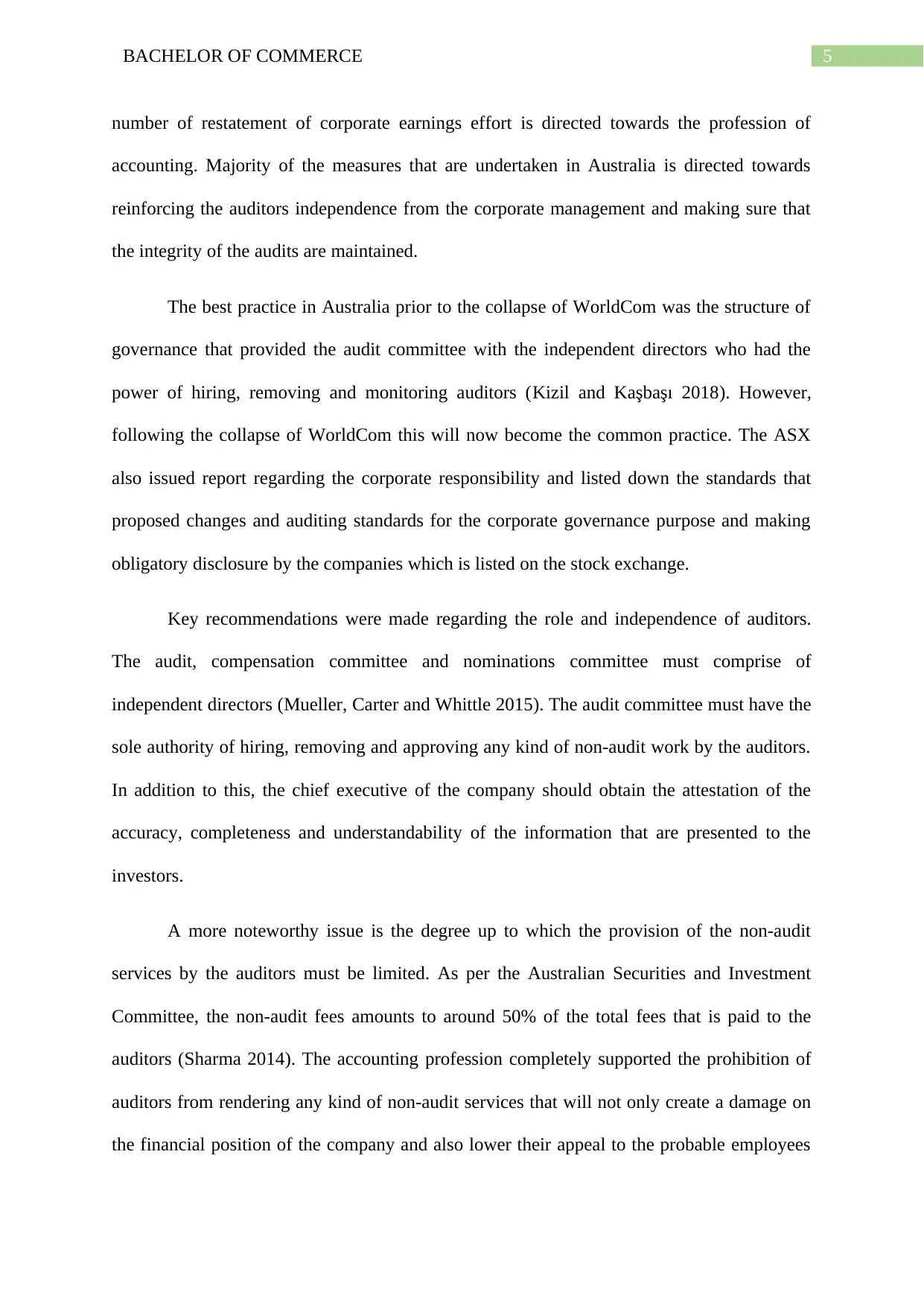
5BACHELOR OF COMMERCE
number of restatement of corporate earnings effort is directed towards the profession of
accounting. Majority of the measures that are undertaken in Australia is directed towards
reinforcing the auditors independence from the corporate management and making sure that
the integrity of the audits are maintained.
The best practice in Australia prior to the collapse of WorldCom was the structure of
governance that provided the audit committee with the independent directors who had the
power of hiring, removing and monitoring auditors (Kizil and Kaşbaşı 2018). However,
following the collapse of WorldCom this will now become the common practice. The ASX
also issued report regarding the corporate responsibility and listed down the standards that
proposed changes and auditing standards for the corporate governance purpose and making
obligatory disclosure by the companies which is listed on the stock exchange.
Key recommendations were made regarding the role and independence of auditors.
The audit, compensation committee and nominations committee must comprise of
independent directors (Mueller, Carter and Whittle 2015). The audit committee must have the
sole authority of hiring, removing and approving any kind of non-audit work by the auditors.
In addition to this, the chief executive of the company should obtain the attestation of the
accuracy, completeness and understandability of the information that are presented to the
investors.
A more noteworthy issue is the degree up to which the provision of the non-audit
services by the auditors must be limited. As per the Australian Securities and Investment
Committee, the non-audit fees amounts to around 50% of the total fees that is paid to the
auditors (Sharma 2014). The accounting profession completely supported the prohibition of
auditors from rendering any kind of non-audit services that will not only create a damage on
the financial position of the company and also lower their appeal to the probable employees
number of restatement of corporate earnings effort is directed towards the profession of
accounting. Majority of the measures that are undertaken in Australia is directed towards
reinforcing the auditors independence from the corporate management and making sure that
the integrity of the audits are maintained.
The best practice in Australia prior to the collapse of WorldCom was the structure of
governance that provided the audit committee with the independent directors who had the
power of hiring, removing and monitoring auditors (Kizil and Kaşbaşı 2018). However,
following the collapse of WorldCom this will now become the common practice. The ASX
also issued report regarding the corporate responsibility and listed down the standards that
proposed changes and auditing standards for the corporate governance purpose and making
obligatory disclosure by the companies which is listed on the stock exchange.
Key recommendations were made regarding the role and independence of auditors.
The audit, compensation committee and nominations committee must comprise of
independent directors (Mueller, Carter and Whittle 2015). The audit committee must have the
sole authority of hiring, removing and approving any kind of non-audit work by the auditors.
In addition to this, the chief executive of the company should obtain the attestation of the
accuracy, completeness and understandability of the information that are presented to the
investors.
A more noteworthy issue is the degree up to which the provision of the non-audit
services by the auditors must be limited. As per the Australian Securities and Investment
Committee, the non-audit fees amounts to around 50% of the total fees that is paid to the
auditors (Sharma 2014). The accounting profession completely supported the prohibition of
auditors from rendering any kind of non-audit services that will not only create a damage on
the financial position of the company and also lower their appeal to the probable employees
⊘ This is a preview!⊘
Do you want full access?
Subscribe today to unlock all pages.

Trusted by 1+ million students worldwide
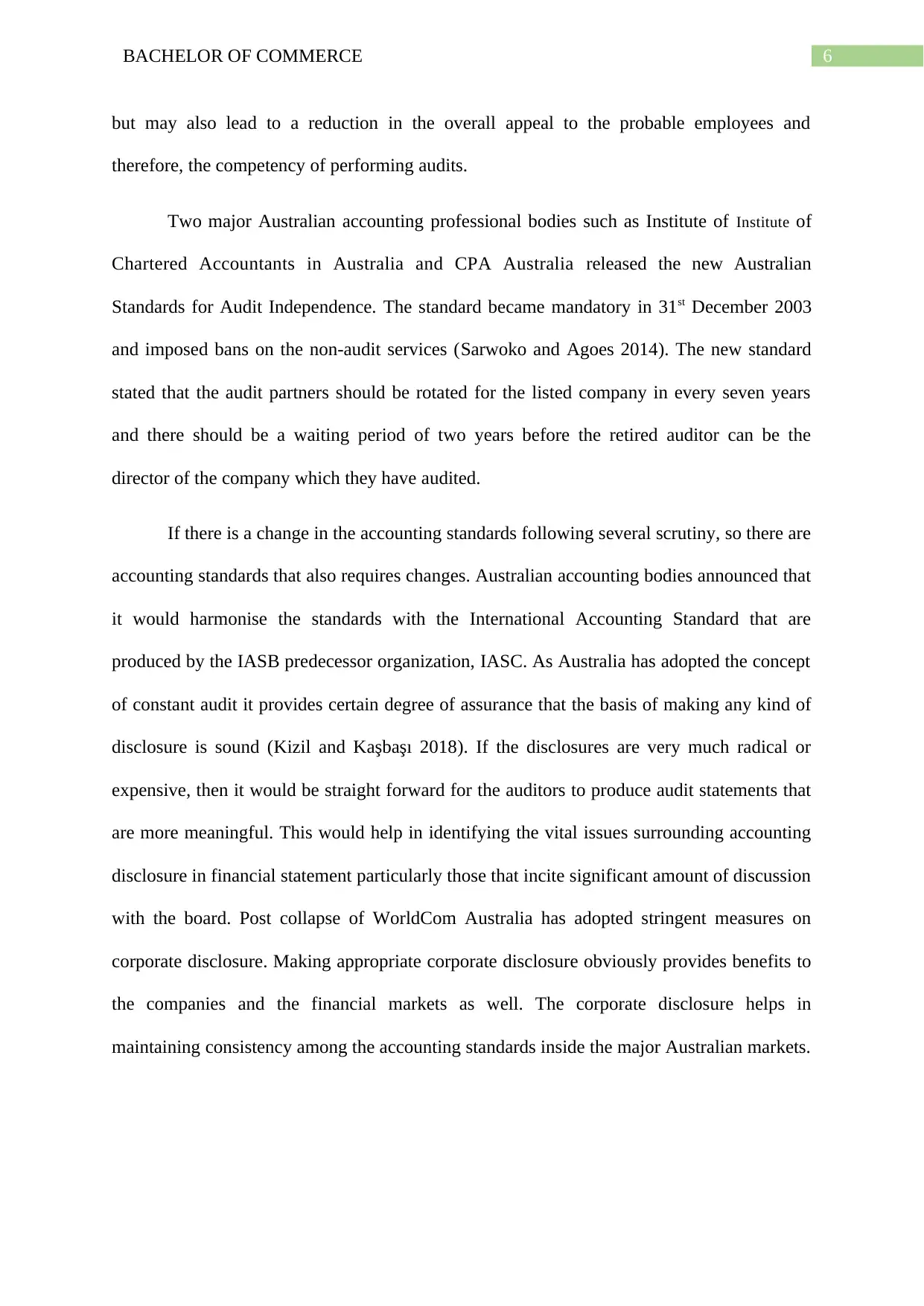
6BACHELOR OF COMMERCE
but may also lead to a reduction in the overall appeal to the probable employees and
therefore, the competency of performing audits.
Two major Australian accounting professional bodies such as Institute of Institute of
Chartered Accountants in Australia and CPA Australia released the new Australian
Standards for Audit Independence. The standard became mandatory in 31st December 2003
and imposed bans on the non-audit services (Sarwoko and Agoes 2014). The new standard
stated that the audit partners should be rotated for the listed company in every seven years
and there should be a waiting period of two years before the retired auditor can be the
director of the company which they have audited.
If there is a change in the accounting standards following several scrutiny, so there are
accounting standards that also requires changes. Australian accounting bodies announced that
it would harmonise the standards with the International Accounting Standard that are
produced by the IASB predecessor organization, IASC. As Australia has adopted the concept
of constant audit it provides certain degree of assurance that the basis of making any kind of
disclosure is sound (Kizil and Kaşbaşı 2018). If the disclosures are very much radical or
expensive, then it would be straight forward for the auditors to produce audit statements that
are more meaningful. This would help in identifying the vital issues surrounding accounting
disclosure in financial statement particularly those that incite significant amount of discussion
with the board. Post collapse of WorldCom Australia has adopted stringent measures on
corporate disclosure. Making appropriate corporate disclosure obviously provides benefits to
the companies and the financial markets as well. The corporate disclosure helps in
maintaining consistency among the accounting standards inside the major Australian markets.
but may also lead to a reduction in the overall appeal to the probable employees and
therefore, the competency of performing audits.
Two major Australian accounting professional bodies such as Institute of Institute of
Chartered Accountants in Australia and CPA Australia released the new Australian
Standards for Audit Independence. The standard became mandatory in 31st December 2003
and imposed bans on the non-audit services (Sarwoko and Agoes 2014). The new standard
stated that the audit partners should be rotated for the listed company in every seven years
and there should be a waiting period of two years before the retired auditor can be the
director of the company which they have audited.
If there is a change in the accounting standards following several scrutiny, so there are
accounting standards that also requires changes. Australian accounting bodies announced that
it would harmonise the standards with the International Accounting Standard that are
produced by the IASB predecessor organization, IASC. As Australia has adopted the concept
of constant audit it provides certain degree of assurance that the basis of making any kind of
disclosure is sound (Kizil and Kaşbaşı 2018). If the disclosures are very much radical or
expensive, then it would be straight forward for the auditors to produce audit statements that
are more meaningful. This would help in identifying the vital issues surrounding accounting
disclosure in financial statement particularly those that incite significant amount of discussion
with the board. Post collapse of WorldCom Australia has adopted stringent measures on
corporate disclosure. Making appropriate corporate disclosure obviously provides benefits to
the companies and the financial markets as well. The corporate disclosure helps in
maintaining consistency among the accounting standards inside the major Australian markets.
Paraphrase This Document
Need a fresh take? Get an instant paraphrase of this document with our AI Paraphraser
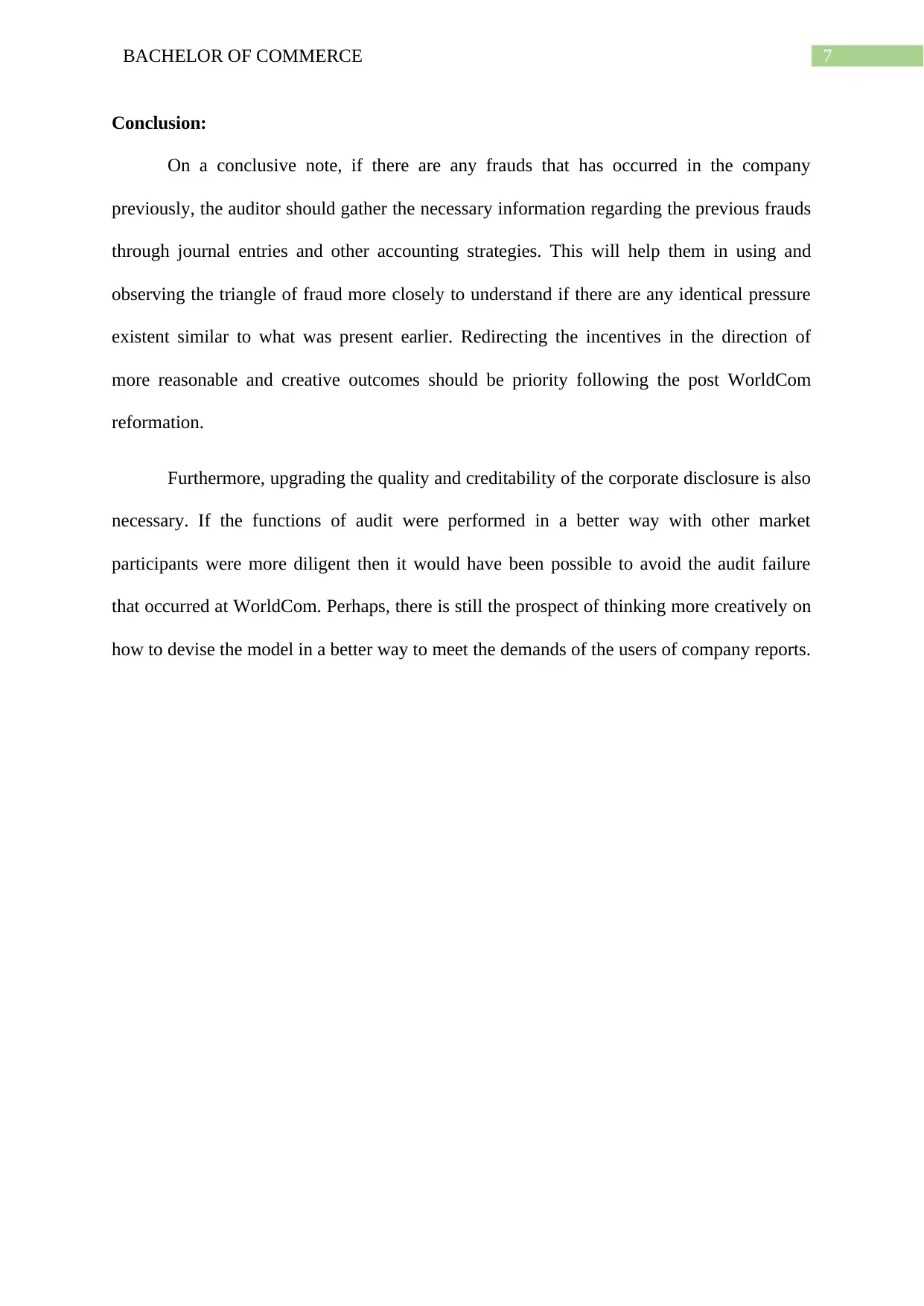
7BACHELOR OF COMMERCE
Conclusion:
On a conclusive note, if there are any frauds that has occurred in the company
previously, the auditor should gather the necessary information regarding the previous frauds
through journal entries and other accounting strategies. This will help them in using and
observing the triangle of fraud more closely to understand if there are any identical pressure
existent similar to what was present earlier. Redirecting the incentives in the direction of
more reasonable and creative outcomes should be priority following the post WorldCom
reformation.
Furthermore, upgrading the quality and creditability of the corporate disclosure is also
necessary. If the functions of audit were performed in a better way with other market
participants were more diligent then it would have been possible to avoid the audit failure
that occurred at WorldCom. Perhaps, there is still the prospect of thinking more creatively on
how to devise the model in a better way to meet the demands of the users of company reports.
Conclusion:
On a conclusive note, if there are any frauds that has occurred in the company
previously, the auditor should gather the necessary information regarding the previous frauds
through journal entries and other accounting strategies. This will help them in using and
observing the triangle of fraud more closely to understand if there are any identical pressure
existent similar to what was present earlier. Redirecting the incentives in the direction of
more reasonable and creative outcomes should be priority following the post WorldCom
reformation.
Furthermore, upgrading the quality and creditability of the corporate disclosure is also
necessary. If the functions of audit were performed in a better way with other market
participants were more diligent then it would have been possible to avoid the audit failure
that occurred at WorldCom. Perhaps, there is still the prospect of thinking more creatively on
how to devise the model in a better way to meet the demands of the users of company reports.
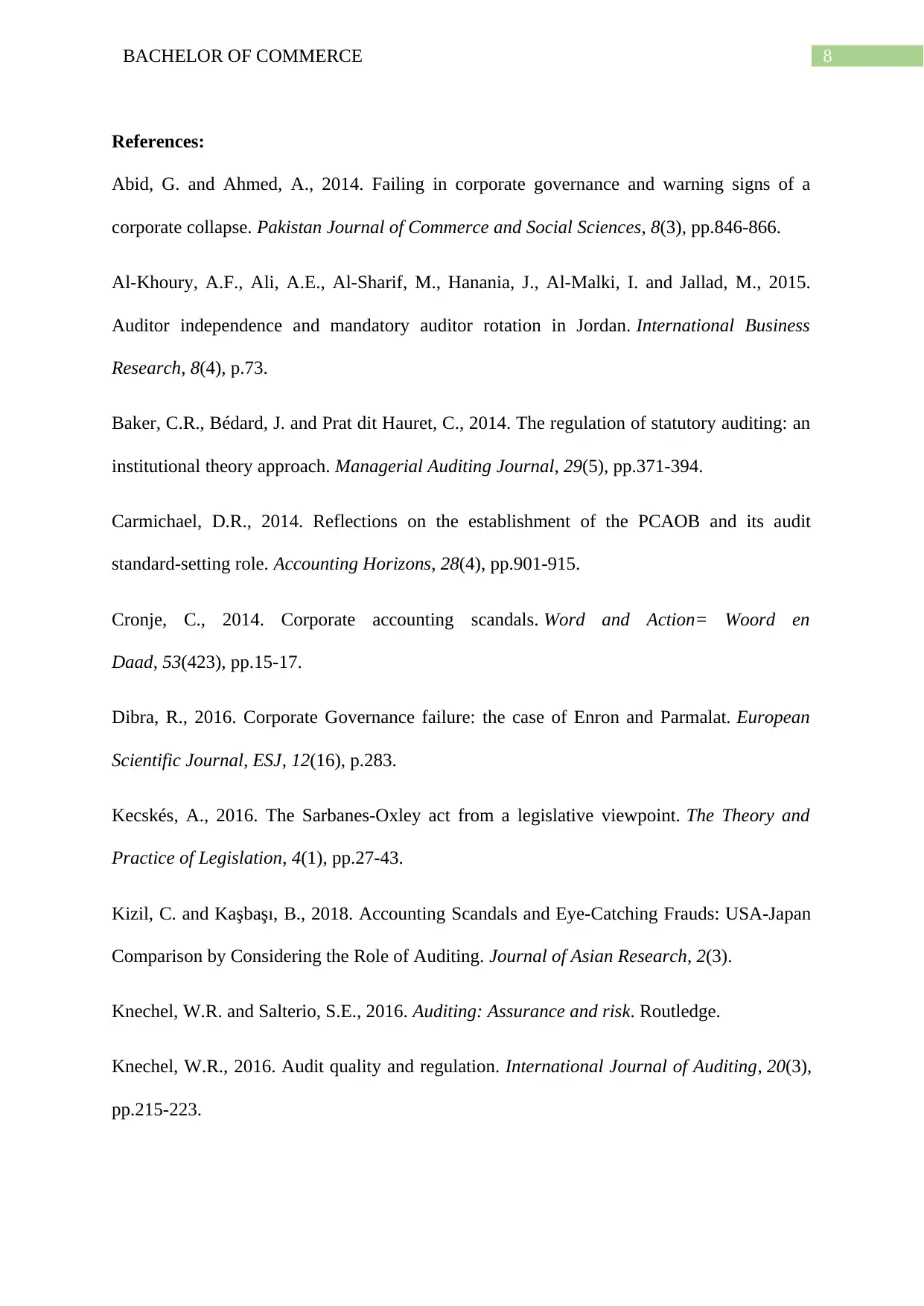
8BACHELOR OF COMMERCE
References:
Abid, G. and Ahmed, A., 2014. Failing in corporate governance and warning signs of a
corporate collapse. Pakistan Journal of Commerce and Social Sciences, 8(3), pp.846-866.
Al-Khoury, A.F., Ali, A.E., Al-Sharif, M., Hanania, J., Al-Malki, I. and Jallad, M., 2015.
Auditor independence and mandatory auditor rotation in Jordan. International Business
Research, 8(4), p.73.
Baker, C.R., Bédard, J. and Prat dit Hauret, C., 2014. The regulation of statutory auditing: an
institutional theory approach. Managerial Auditing Journal, 29(5), pp.371-394.
Carmichael, D.R., 2014. Reflections on the establishment of the PCAOB and its audit
standard-setting role. Accounting Horizons, 28(4), pp.901-915.
Cronje, C., 2014. Corporate accounting scandals. Word and Action= Woord en
Daad, 53(423), pp.15-17.
Dibra, R., 2016. Corporate Governance failure: the case of Enron and Parmalat. European
Scientific Journal, ESJ, 12(16), p.283.
Kecskés, A., 2016. The Sarbanes-Oxley act from a legislative viewpoint. The Theory and
Practice of Legislation, 4(1), pp.27-43.
Kizil, C. and Kaşbaşı, B., 2018. Accounting Scandals and Eye-Catching Frauds: USA-Japan
Comparison by Considering the Role of Auditing. Journal of Asian Research, 2(3).
Knechel, W.R. and Salterio, S.E., 2016. Auditing: Assurance and risk. Routledge.
Knechel, W.R., 2016. Audit quality and regulation. International Journal of Auditing, 20(3),
pp.215-223.
References:
Abid, G. and Ahmed, A., 2014. Failing in corporate governance and warning signs of a
corporate collapse. Pakistan Journal of Commerce and Social Sciences, 8(3), pp.846-866.
Al-Khoury, A.F., Ali, A.E., Al-Sharif, M., Hanania, J., Al-Malki, I. and Jallad, M., 2015.
Auditor independence and mandatory auditor rotation in Jordan. International Business
Research, 8(4), p.73.
Baker, C.R., Bédard, J. and Prat dit Hauret, C., 2014. The regulation of statutory auditing: an
institutional theory approach. Managerial Auditing Journal, 29(5), pp.371-394.
Carmichael, D.R., 2014. Reflections on the establishment of the PCAOB and its audit
standard-setting role. Accounting Horizons, 28(4), pp.901-915.
Cronje, C., 2014. Corporate accounting scandals. Word and Action= Woord en
Daad, 53(423), pp.15-17.
Dibra, R., 2016. Corporate Governance failure: the case of Enron and Parmalat. European
Scientific Journal, ESJ, 12(16), p.283.
Kecskés, A., 2016. The Sarbanes-Oxley act from a legislative viewpoint. The Theory and
Practice of Legislation, 4(1), pp.27-43.
Kizil, C. and Kaşbaşı, B., 2018. Accounting Scandals and Eye-Catching Frauds: USA-Japan
Comparison by Considering the Role of Auditing. Journal of Asian Research, 2(3).
Knechel, W.R. and Salterio, S.E., 2016. Auditing: Assurance and risk. Routledge.
Knechel, W.R., 2016. Audit quality and regulation. International Journal of Auditing, 20(3),
pp.215-223.
⊘ This is a preview!⊘
Do you want full access?
Subscribe today to unlock all pages.

Trusted by 1+ million students worldwide
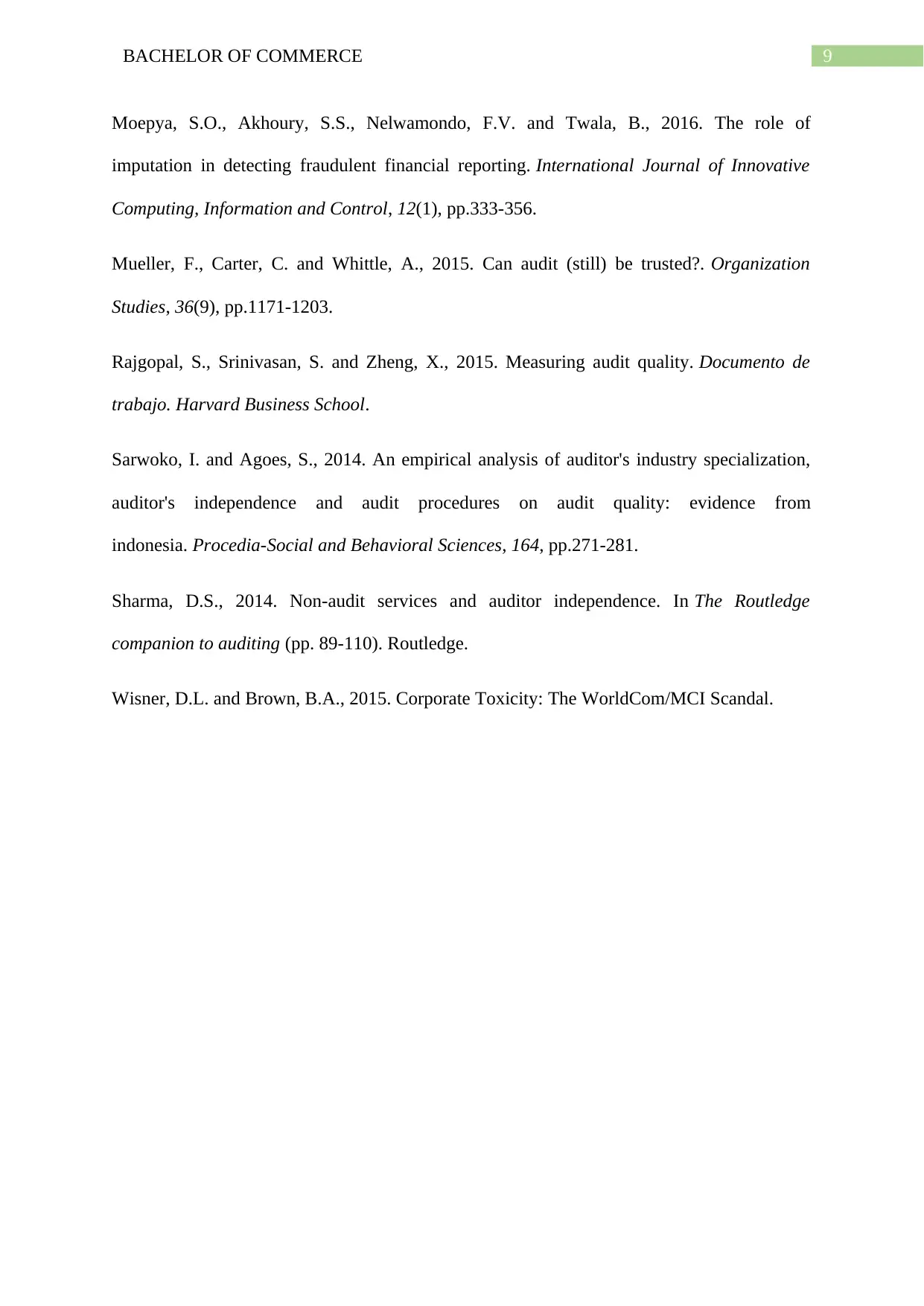
9BACHELOR OF COMMERCE
Moepya, S.O., Akhoury, S.S., Nelwamondo, F.V. and Twala, B., 2016. The role of
imputation in detecting fraudulent financial reporting. International Journal of Innovative
Computing, Information and Control, 12(1), pp.333-356.
Mueller, F., Carter, C. and Whittle, A., 2015. Can audit (still) be trusted?. Organization
Studies, 36(9), pp.1171-1203.
Rajgopal, S., Srinivasan, S. and Zheng, X., 2015. Measuring audit quality. Documento de
trabajo. Harvard Business School.
Sarwoko, I. and Agoes, S., 2014. An empirical analysis of auditor's industry specialization,
auditor's independence and audit procedures on audit quality: evidence from
indonesia. Procedia-Social and Behavioral Sciences, 164, pp.271-281.
Sharma, D.S., 2014. Non-audit services and auditor independence. In The Routledge
companion to auditing (pp. 89-110). Routledge.
Wisner, D.L. and Brown, B.A., 2015. Corporate Toxicity: The WorldCom/MCI Scandal.
Moepya, S.O., Akhoury, S.S., Nelwamondo, F.V. and Twala, B., 2016. The role of
imputation in detecting fraudulent financial reporting. International Journal of Innovative
Computing, Information and Control, 12(1), pp.333-356.
Mueller, F., Carter, C. and Whittle, A., 2015. Can audit (still) be trusted?. Organization
Studies, 36(9), pp.1171-1203.
Rajgopal, S., Srinivasan, S. and Zheng, X., 2015. Measuring audit quality. Documento de
trabajo. Harvard Business School.
Sarwoko, I. and Agoes, S., 2014. An empirical analysis of auditor's industry specialization,
auditor's independence and audit procedures on audit quality: evidence from
indonesia. Procedia-Social and Behavioral Sciences, 164, pp.271-281.
Sharma, D.S., 2014. Non-audit services and auditor independence. In The Routledge
companion to auditing (pp. 89-110). Routledge.
Wisner, D.L. and Brown, B.A., 2015. Corporate Toxicity: The WorldCom/MCI Scandal.
1 out of 10
Related Documents
Your All-in-One AI-Powered Toolkit for Academic Success.
+13062052269
info@desklib.com
Available 24*7 on WhatsApp / Email
![[object Object]](/_next/static/media/star-bottom.7253800d.svg)
Unlock your academic potential
Copyright © 2020–2026 A2Z Services. All Rights Reserved. Developed and managed by ZUCOL.




